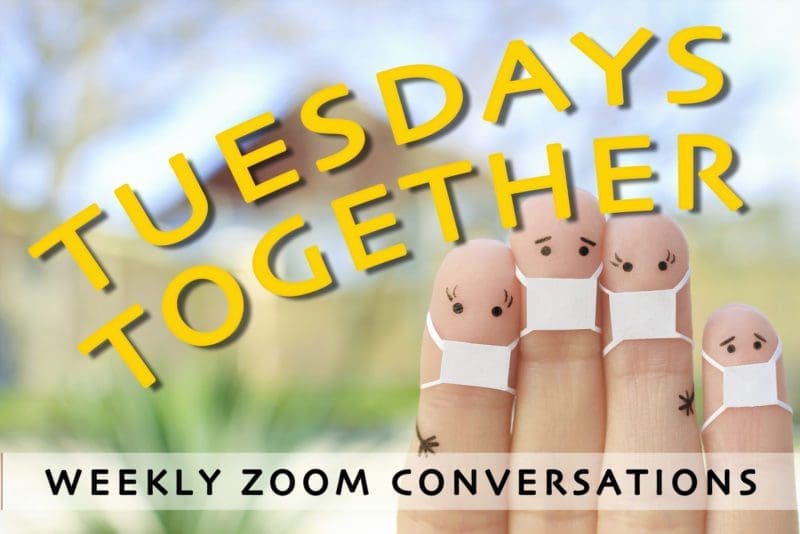ANNOUNCEMENTS
TUESDAY TOGETHER | 6-22-2021

8 HABITS – PART 1
[PDF LINK]
Ray Jones III, “It is interesting to me that evangelism, the very word that means to declare good news and glad tidings, has become a dirty word. When an essential ministry of the church is distorted by religious zealots and used to judge others to determine who is “in” and who is “out” of the community of faith, the message of glad tidings is turned into judgment and exclusion – a dirty word.”
—
- Is evangelism a “dirty word” in your vocabulary? Your church? For your session? Why or why not?
- What does the word “evangelism” conjure up for you? What experiences would you cite?
Ray Jones III, “Evangelism in the 21st century North American context must be experienced as a journey of going deeper in our faith, relationships around us and God’s mission of rescue and reconciliation. This journey of faith engages formation habits that change our lives and the world around us. When we open ourselves to God’s love, justice and the people around us, we encounter the reconciliation of all things and the saving grace of Jesus. The beauty of this journey is that this transformation process always opens us to the wonder of God. And along the journey we realize that all people can breathe. Oh my, all people breathing the breath of God! Now that’s a story worth living and telling.”
—
- Evangelism as “all people breathing the breath of God,” what do you think of that?
RADICAL WELCOME
The practice of radical welcome: “Radical welcome is the spiritual practice of embracing and being changed by the gifts, presence, voices and power of The Other: the people systemically cast out of or marginalized within a church, a denomination and/or society.”
Habits for radical welcome:
- Develop a plan that all can participate in.
- Don’t always expect them to come to you.
- Reflect diversity in who leads.
- Worship should not always be how it has always been.
- Do your own work.
- Even if not on the first, don’t give up.
“In its most simplest form, radical welcome is the spiritual ability to see the will of God to create, foster, make room for and be an active participant in beloved community that calls us outside of our proclivity to fear and into the brave loving strength of togetherness. It is the difference between inviting visitors in your home and welcoming family. One is temporal and the other is belonging.”
—
- Which communities of people are absent from your space?
- What do you feel have been the barriers to you living into radical welcome and what do you hope to reimagine for your future?
- How have you prepared personally to engage in connection with those who have been “othered”?
- In what ways have you practiced radical welcome in your faith community?
- Where do you see places where your community can extend more radical welcome?
WORSHIP
The practice of worship: “At the end of the day, this is not even about in-person or online worship, but about creating and curating a space for God’s people to gather, no matter “where” that is. We have always done the work to make sure these spaces are contextually appropriate, visually tended to, inclusive of broad participation, and built upon the love, hope, peace and joy of Christ Jesus. Today we have been given the chance to expand that experience even more.”
HABITS FOR WORSHIP:
- Reimagine rather than replicate.
- Add more seats to the table.
- Think DJ (DJs curate space that draw people into a communal experience. They create the general vibe..)
—
Focusing on worship during a time of pandemic:
- SORROW: What have you lost? What losses have we grieved?
- JOY: What have you gained? Where have we seen new life and growth?
- LEARNINGS: What have you learned about yourself as a congregation, as participants and as leaders during this time of pandemic? What has surprised you about how you have navigated this season of life together?
- POSSIBILITIES: What worship practices or perspectives might God be revealing before your community as you move forward?
SACRAMENTS
“Grace is God’s divine gift of love. We cannot work for it. We cannot earn it. We cannot put our fingers on it. And yet, it is through the sacraments that we have an opportunity to experience God’s love for us in extraordinary ways. Within our Book of Order, we are reminded that:
The Sacraments are both physical signs and spiritual gifts, including words and actions, surrounded by prayer, in the context of the Church’s common worship. They employ ordinary things — the basic elements of water, bread, and wine — in proclaiming the extraordinary love of God.
“I love that last line. Ordinary things are employed to proclaim the extraordinary love of God. This language invites us to be fully present in the participation of the sacraments. The shift from ordinary to extraordinary is an invitation to see God’s extraordinary activity at work in the everyday and common things. It is an invitation to be present, to take and receive God’s extraordinary love and to be made new once again. Participating in the sacraments invites us to practice being fully present in them.”
Practice Living Sacramentally in Our Ordinary Days: “The practice of living sacramentally can be equated to the practice of mindfulness and being intentional.” … “Living sacramentally takes an intentional approach to daily practices of living and moves through them with prayer, thoughtfulness and eyes wide open to the miracle working power of God in small and subtle movements.”
HABITS FOR SACRAMENTS:
- Rest.
- Reflect.
- Rediscover.
- Resist (the temptation of going through the motions).
—
- Do you regularly participate in a sabbath-keeping period of time wherein you allow God to place you beside still waters? How could regular sabbath-keeping allow you to live sacramentally in your everyday life?
- In what ways could living sacramentally (mindful, aware, intentional) impact your connection with God? In what ways could living sacramentally proclaim the gospel of Jesus Christ to others through both your words and your actions?
PRAYER
“But in the lives of early followers of Jesus, there was something so uncommon and attractive about the way they prayed, that it literally drew people to them.
“Alan Kreider writes:
Indeed, it was the early Christians’ practice of prayer that empowered them and gave them buoyancy. Because they believed that God answers prayers, they could take risks, live lives that were eventful and imprudent, and be faithful … [even when it got] them into hot water …
[When] … outsiders got a whiff of it, they wanted in.
HABITS FOR PRAYER
- A routine of personal encounter with God through prayer. (Daily)
- A regular practice of praying with others. (Weekly or biweekly)
- A regular practice of expecting, identifying and naming answers to prayer. (Whenever you pray)
- A routine of “Prayer Walking” in your neighborhood, place of work or community, looking for the activity of God. (Once or twice a week)
- A regular practice of praying in person with neighbors, co-workers, family and friends. (Whenever someone expresses a deep-felt concern, joy, or need)
—
- How do habits like the ones suggested contribute to a distinctively Christian lifestyle? Why are habits more powerful for evangelism than spontaneous, occasional practices?
- Research indicates that on average it takes two months or more to develop a new habit. What will you and your fellow believers need to do to develop new habits around prayer?
- Why is it important to have both personal and corporate prayer habits?
